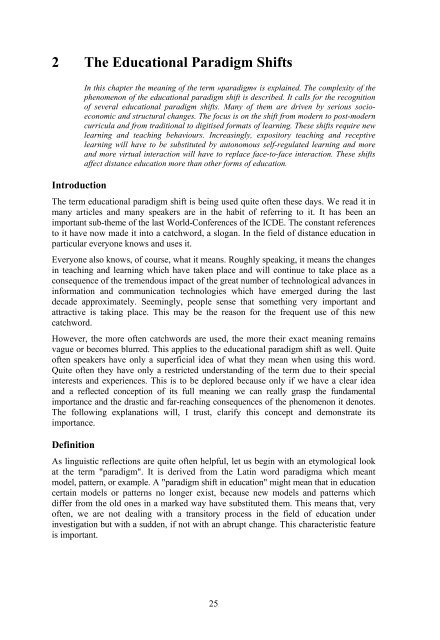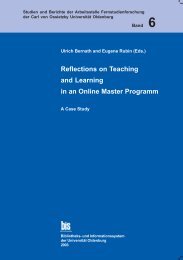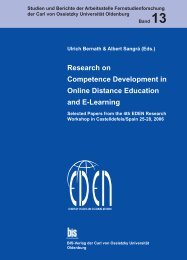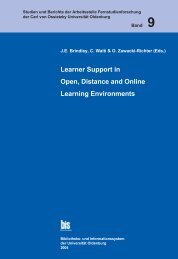Distance Education in Transition - Master of Distance Education ...
Distance Education in Transition - Master of Distance Education ...
Distance Education in Transition - Master of Distance Education ...
Create successful ePaper yourself
Turn your PDF publications into a flip-book with our unique Google optimized e-Paper software.
2 The <strong>Education</strong>al Paradigm Shifts<br />
Introduction<br />
In this chapter the mean<strong>in</strong>g <strong>of</strong> the term »paradigm« is expla<strong>in</strong>ed. The complexity <strong>of</strong> the<br />
phenomenon <strong>of</strong> the educational paradigm shift is described. It calls for the recognition<br />
<strong>of</strong> several educational paradigm shifts. Many <strong>of</strong> them are driven by serious socioeconomic<br />
and structural changes. The focus is on the shift from modern to post-modern<br />
curricula and from traditional to digitised formats <strong>of</strong> learn<strong>in</strong>g. These shifts require new<br />
learn<strong>in</strong>g and teach<strong>in</strong>g behaviours. Increas<strong>in</strong>gly, expository teach<strong>in</strong>g and receptive<br />
learn<strong>in</strong>g will have to be substituted by autonomous self-regulated learn<strong>in</strong>g and more<br />
and more virtual <strong>in</strong>teraction will have to replace face-to-face <strong>in</strong>teraction. These shifts<br />
affect distance education more than other forms <strong>of</strong> education.<br />
The term educational paradigm shift is be<strong>in</strong>g used quite <strong>of</strong>ten these days. We read it <strong>in</strong><br />
many articles and many speakers are <strong>in</strong> the habit <strong>of</strong> referr<strong>in</strong>g to it. It has been an<br />
important sub-theme <strong>of</strong> the last World-Conferences <strong>of</strong> the ICDE. The constant references<br />
to it have now made it <strong>in</strong>to a catchword, a slogan. In the field <strong>of</strong> distance education <strong>in</strong><br />
particular everyone knows and uses it.<br />
Everyone also knows, <strong>of</strong> course, what it means. Roughly speak<strong>in</strong>g, it means the changes<br />
<strong>in</strong> teach<strong>in</strong>g and learn<strong>in</strong>g which have taken place and will cont<strong>in</strong>ue to take place as a<br />
consequence <strong>of</strong> the tremendous impact <strong>of</strong> the great number <strong>of</strong> technological advances <strong>in</strong><br />
<strong>in</strong>formation and communication technologies which have emerged dur<strong>in</strong>g the last<br />
decade approximately. Seem<strong>in</strong>gly, people sense that someth<strong>in</strong>g very important and<br />
attractive is tak<strong>in</strong>g place. This may be the reason for the frequent use <strong>of</strong> this new<br />
catchword.<br />
However, the more <strong>of</strong>ten catchwords are used, the more their exact mean<strong>in</strong>g rema<strong>in</strong>s<br />
vague or becomes blurred. This applies to the educational paradigm shift as well. Quite<br />
<strong>of</strong>ten speakers have only a superficial idea <strong>of</strong> what they mean when us<strong>in</strong>g this word.<br />
Quite <strong>of</strong>ten they have only a restricted understand<strong>in</strong>g <strong>of</strong> the term due to their special<br />
<strong>in</strong>terests and experiences. This is to be deplored because only if we have a clear idea<br />
and a reflected conception <strong>of</strong> its full mean<strong>in</strong>g we can really grasp the fundamental<br />
importance and the drastic and far-reach<strong>in</strong>g consequences <strong>of</strong> the phenomenon it denotes.<br />
The follow<strong>in</strong>g explanations will, I trust, clarify this concept and demonstrate its<br />
importance.<br />
Def<strong>in</strong>ition<br />
As l<strong>in</strong>guistic reflections are quite <strong>of</strong>ten helpful, let us beg<strong>in</strong> with an etymological look<br />
at the term "paradigm". It is derived from the Lat<strong>in</strong> word paradigma which meant<br />
model, pattern, or example. A "paradigm shift <strong>in</strong> education" might mean that <strong>in</strong> education<br />
certa<strong>in</strong> models or patterns no longer exist, because new models and patterns which<br />
differ from the old ones <strong>in</strong> a marked way have substituted them. This means that, very<br />
<strong>of</strong>ten, we are not deal<strong>in</strong>g with a transitory process <strong>in</strong> the field <strong>of</strong> education under<br />
<strong>in</strong>vestigation but with a sudden, if not with an abrupt change. This characteristic feature<br />
is important.<br />
25





